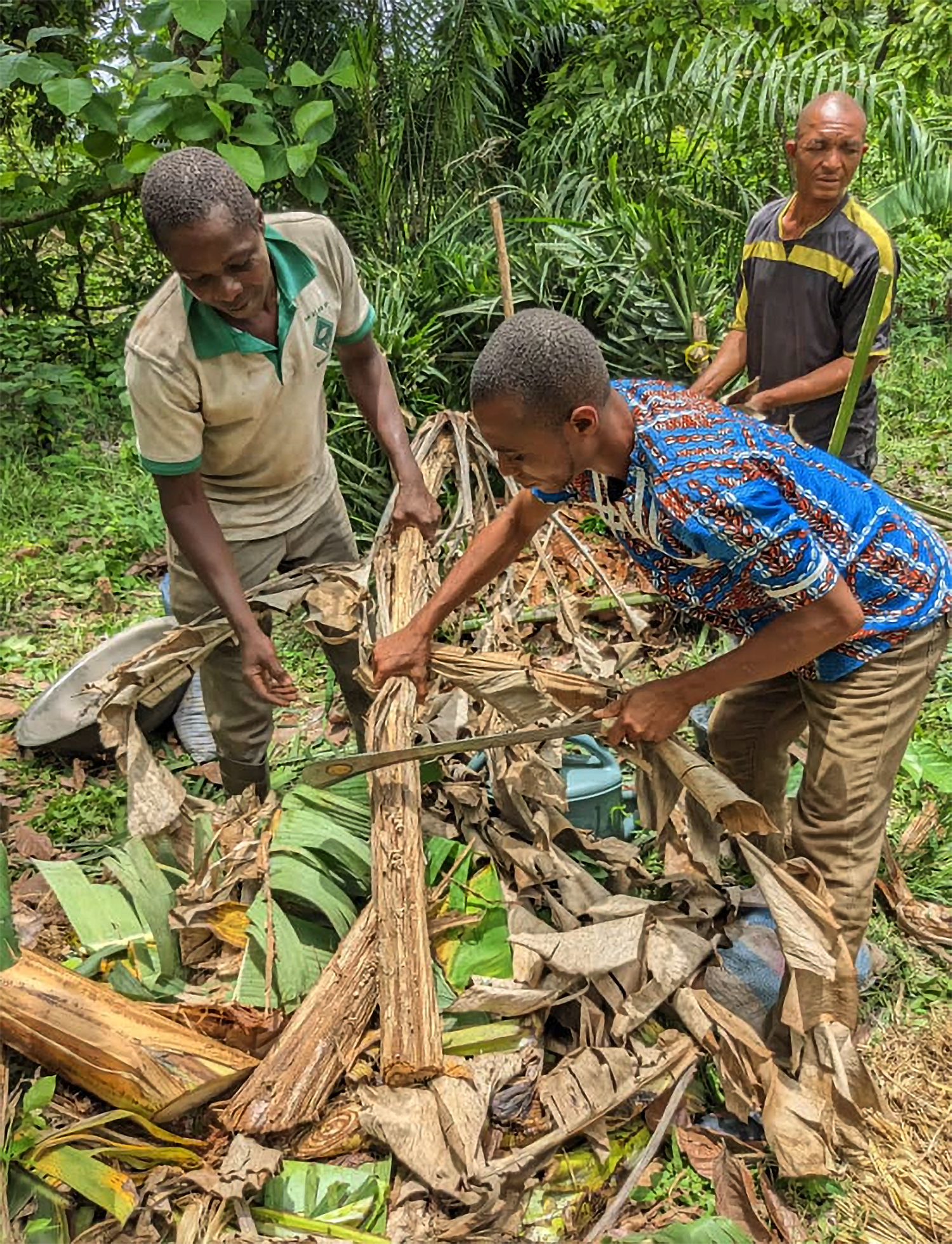Establishing Organic Input and Farming Services
What is the main objective of the project?
The project's main goal is to contribute to the living income of smallholder farmers who produce organic cocoa in Togo. This shall be achieved by improving the productivity of the farms, which currently lags behind neighbouring countries. gebana collaborates with 2000 farmers and their families, who follow organic farming methods. Organic farming faces challenges regarding insect and diseases as chemical pesticides cannot be used, and commercial biological pesticides are too expensive. We currently support them with imported neem tree oil, which is expensive, too. To address this, we test the establishment of local production of neem oil as well as offering spraying services to farmers, as typically they lack equipment. We will also test the provision of pruning services, the commercialisation of compost at medium scale and the production of biochar from neem cake and cocoa husk. The project name SoNuLi is an abbreviation of “Sosominaxoe Nunyame – Liliti”, which can be translated as “state of equilibrium in nutrients - neem tree”.
How will the project contribute to sustainable cocoa production?
The entity established and the services provided are intended to increase productivity and thus also the income of organic farmers and their families. This will encourage farmers to continue with organic farming, and others to join the movement. By promoting sustainable agricultural practices, biodiversity and resilience to climate change are improved. Through local sourcing, production, and job creation, SoNuLi can make an important contribution to economic development in the Kpalimé region.
What steps are taken during the project?
The project will start with the establishment of the women-led business entity SoNuLi. Different products and services will be tested and implemented: the production and sale of neem oil, the development of spraying and pruning services, the production and sale of compost as well as the production and sale/distribution of biochar from neem cake (residues from the oil production) and/or cocoa husk. A prototyping approach is used to develop the products and services. This involves getting feedback from potential users at an early stage through prototypes and storyboards. Based on this feedback, ideas are adapted, scaled, or stopped. The goal is to create innovative solutions that are desirable, practical, and feasible.
What is innovative about this project?
Although the neem tree is an endemic tree in the region, neem oil is not being produced in Togo as of now (at least not on a larger scale). With the production of our own neem oil in large quantities we can eliminate reliance on imports while also offering it at a more affordable price.
Two new commercial services spraying and pruning will be introduced, which are currently not available in Togo (at least not for smallholder farmers). The spraying of the fields with neem oil will ensure the effective use of it. Pruning could enhance the growth and fruit production of trees while reducing the occurrence of fungus. However, farmers lack knowledge of good practices and equipment. gebana's pruning services can address this gap. The business entity tests the production of biochar from the leftovers of the neem cake and from the cocoa fruit husk. This is an innovative solution as a substitute for normal charcoal, which may sequester CO2 and improve soils if applied to soils. Soy and cotton value chains in particular are in need of liming, and biochar could replace lime.
In addition, the project will test the viability of a commercial compost unit or decentralised composted units. This would be a valuable contribution to the availability of compost and to the management of soil fertility and thus to the productivity and sustainability of agricultural land.
The project will follow the design-thinking approach for innovation, with which it will prototype and test the products and solutions together with the potential users (customers).

«In my opinion, this project stands out for the fact that it focuses on the well-being of small family farmers, aims to promote healthy and sustainable agriculture based on good organic practices, is committed to the development of the locality by employing local labour and enables women to occupy positions of responsibility.»
How does the project contribute to improving the (economic) situation of girls and women?
The business unit is headed by a woman. It is also the aim that as many women as possible can be involved in this business and take on other leading roles. Promoting that women can gain a foothold in the agribusiness world, earn their own living, and thus also gain independence is a central aspect of our project. We would like to enable these women to become role models for other women to change the traditional image, to empower women and to show that they are just as capable of making decisions and taking responsibility. With this approach, the project will take a pioneering role within the rural community of Kpalimé.
How do you plan to ensure the scalability of the sustainable innovations implemented in the cocoa value chain?
The project was developed based on the needs of the farmers and the local conditions. It is run and built by local people. This is key to the long-term success of the project. The project will be set up as an independent business and should be able to finance itself after the initial phase. Revenue derived from various services can be invested to scale successful products and services. Activities, outputs, and results are continuously monitored. Based on this, adjustments can be made, and decisions taken. Through the Swiss Platform for Sustainable Cocoa (SWISSCO), gebana can promote successful business models beyond Togo so that others can also adopt them.
Organisations involved


